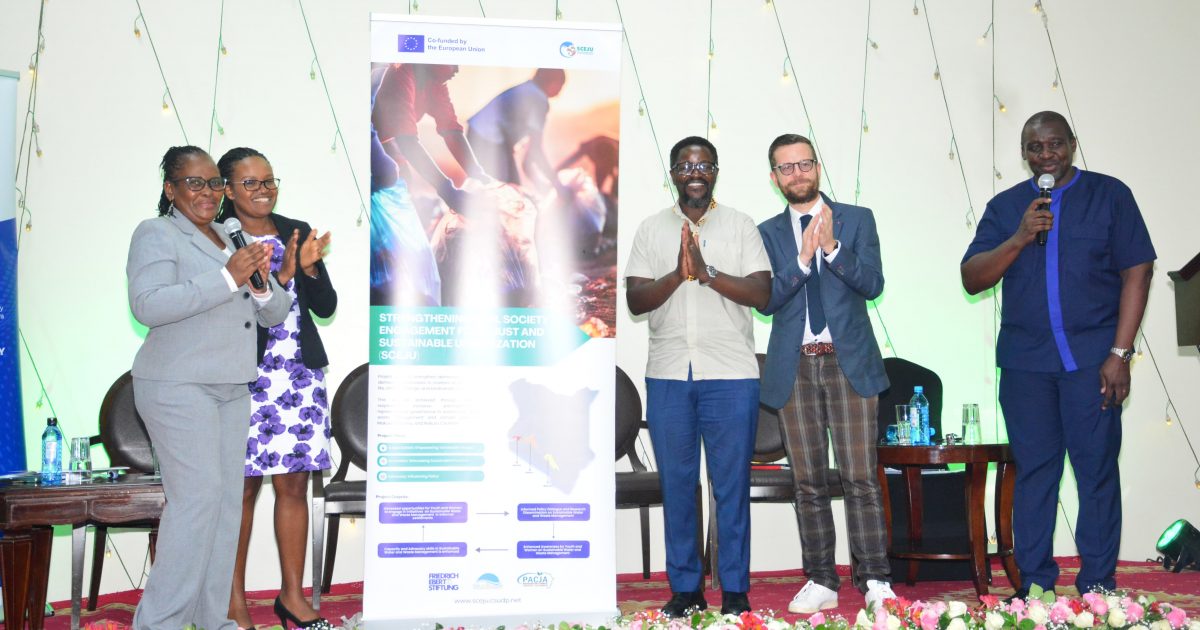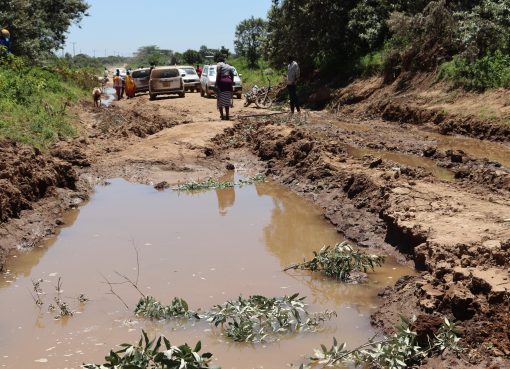Strengthening Civil Society Engagement for a Just and Sustainable Urbanization (SCEJU) has launched its three-year action plan for the year 2024-2026 that is aimed at championing urban sustainability and empower youths as climate leaders.
The project is co-funded by European Union and comprises the Friedrich-Ebert-Stiftung (FES-Kenya), the Civil Society urban Development Platform (CSUDP), and the Pan African Climate Justice Alliance (PACJA) to promote sustainable water and waste management project in Kisumu, Nakuru, and Makueni counties.
The SCEJU project’s overall objective is to strengthen democracy and inclusive democratic processes in matters of urban quality of life, climate change, and biodiversity in Kenya.
Although Kenya enacted the Sustainable Waste Management Act 2022, which requires waste sorting at the household level among other eco-friendly regulations, the compliance gap remains wide.
Furthermore, progressive reforms in the water sector, which largely privatized service provision, have not fully favoured the informal settlement areas where the majority of urbanites reside hence the project aims to empower youth, women and vulnerable groups living in urban informal settlements in the target counties to enable them tackle critical challenges in sustainable water and waste management.
Speaking during the launch, the Friedrich Ebert Stiftung Kenya Office Country Representative Bastian Schulz noted that PACJA, CSUDP and FES bring their experience from different sectors to work together in order to overcome existing barriers and make water and waste management not only more inclusive but also more sustainable and equitable.
“Stronger voice, enhanced capacity and more just policies and policy implementation are the focus of our joint commitment. As we target Kisumu, Nakuru and Makueni counties, SCEJU aims to assist vulnerable urban communities, particularly women and youth, to address persistent challenges that threaten sustainable water and waste management despite constitutional guarantees,” he explained.
At the same time, Head of Programmes and Research at PACJA Charles Mwangi added that SCEJU aims to transform and empower youth, women, and vulnerable groups in Kisumu, Makueni and Nakuru counties to become architects of their climate-resilient future since urban informal settlements and vulnerable communities face daily challenges with water access and waste management – challenges that grow more severe climate change yearly.
“Our mission goes beyond environmental solutions by ensuring that marginalized communities have an equal say in shaping sustainable urban policies that affect their lives,” maintained Mwangi.
Making his remarks, CEO of the Civil Society Urban Development Platform George Wasonga observed that the 2024 World Cities Day theme, ‘Youth climate change makers, Catalysing local action for urban sustainability’ places the youth as the key drivers in catalyzing local action.
He stated that SCEJU’s capacitation was aimed at unlocking the innovative potential inherent amongst the youth to drive change in the delivery of water and waste services within the informal settlements, which is a deliberate way of positioning the youth as climate change makers.
“Young people are ready to mobilize and with the right support, they can create sustainable change that benefits not only the environment but their communities as well,” he asserted.
Programme Coordinator Friedrich-Ebert-Stiftung Titus Kaloki contemplated that despite youth and women from urban informal settlements in Kenya, to provide the last mile services for a majority to access water and waste management, they remain incapacitated to harness opportunities in those sectors for decent jobs and were often excluded from policy decision-making processes that would empower them.
Furtherly, he disclosed that SCEJU seeks to capacitate and strengthen the youth’s voice to influence better outcomes for them and communities in Makueni, Nakuru and Kisumu counties on sustainable water and waste management.
“By amplifying the critical voices and innovative potential of youth, women and vulnerable populations, and facilitating platforms for stakeholder engagement in policy discourse, SCEJU project aims to influence service delivery, policy and public discourse,” he highlighted.
Kaloki added that the discourse would ensure that the needs and perspectives of groups are recognized, embraced and addressed since climate justice cannot be achieved without amplifying the voices of those who bear the heaviest burden of the climate crisis.
The public launch aims to achieve the objectives bringing together representatives of the target groups such as Youth, Women, and Media Members for a Just and Sustainable Urbanization Platform (JSUP), Ministries and departments both national and county.
Other objectives include network facilitation and knowledge exchange amongst the project beneficiaries, implementing agencies, increase project visibility to attract wider public interest including media involvement to help disseminate information and amplify the project.
By Sharon Atieno



